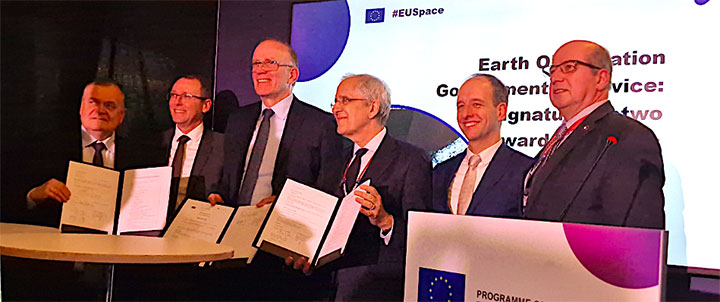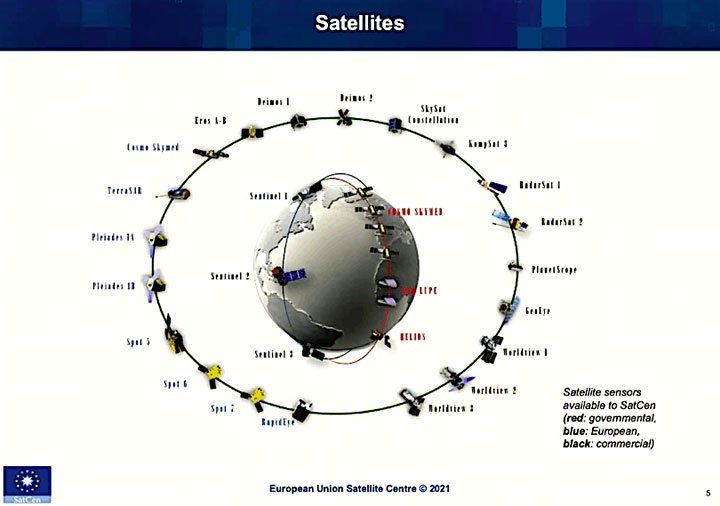 Senior officials from the European Commission, OHB SE, Telespazio, The European Union Agency for the Space Program (EUSPA) and the EU Satellite Centre after the Jan. 23 contract signing of study contracts for an eventual European Union Earth observation governmental service. (Source: Telespazio)
Senior officials from the European Commission, OHB SE, Telespazio, The European Union Agency for the Space Program (EUSPA) and the EU Satellite Centre after the Jan. 23 contract signing of study contracts for an eventual European Union Earth observation governmental service. (Source: Telespazio)
BRUSSELS — The European Commission has taken the first concrete step toward establishing a satellite Earth observation service dedicated to civil government and military use and available to all 27 European Union member states.
The Commission on Jan. 23 signed one-year study contracts with consortia led by OHB SE of Germany and Telespazio of Italy to propose how an Earth Observation Governmental Service (EOGS) should be structured.
The Commission will use these conclusions in preparing a formal EOGS program in its next seven-year budget, starting in 2028. Negotiations on this budget are expected to start in 2025.
The Commission for years has lamented that while individual EU governments — France, Italy, Germany, Spain and Luxembourg — have national space-based intelligence, surveillance and reconnaissance (ISR) capabilities, these images are not readily available to other EU members.
In the past there has been friction between the ISR haves and have-nots over the price charged for access to this imagery. The EU Satellite Centre outside Madrid regularly uses satellite data to file security/defense-related reports on global hotspots for the EU as a whole, but the center’s budget is seen as insufficient to cover the need for high-resolution data.
The center has availed itself of U.S. commercial imagery, but this has been viewed as not optimal to ensure EU independence in defense-related satellite imagery.

OHB and Telespazio have each been given one-year contracts valued at 2.4 million euros ($2.6 million) to perform competing assessments of how the EU might move toward an autonomous ISR capability. The EU Satellite Centre will be involved, as will the European Union Agency for the Space Program, EUSPA, which manages the Copernicus network of environment-monitoring satellites.
“This contract opens up a new area,” OHB SE Chief Executive Marco R. Fuchs said during the signing ceremony here Jan. 23 at the European Space Conference, organized by Business Bridge Europe.
“It is now really going into dual use. Most space companies separate civilian and defense/ The Commission is now looking at its assets and exploration a dual-use approach based on the Copernicus satellites,” Fuchs said. “Robustness and resilience will only come if we combine civilian assets. We cannot believe that in short notice we will have a range of military capability.”
In a statement on the contract, OHB said: “The raw data collected and the data products created from [EOGS] will not only be used for military reconnaissance, bug will also support the work of a wide range fo institutional users from the civilian sector within the EU.”
OHB’s consortium partners are led by CS Group of France, for its satellite ground systems and image-processing capabilities; as well as Geosystems of Germany and Greece; Tekever of Portugal, Geo4I of France, OHB Sweden, Officina Stellare of Italy and the law firm Bird & Bird.
Telespazio Chief Executive Luigi Pasquali said his company is expanding its portfolio in Earth observation. In a statement, Telespazio said the study’s goal is take maximum value from “the considerable and heterogeneous amount of available data,” including the Copernicus network.
The Telespazio consortium includes Airbus France, e-Geos of Italy, Geoville of Austria, Spain’s Hisdesat military satellite operator; PWC of France and Thales Alenia Space Italy. Constellr of Germany, DefSecIntel of Estonia, Endurosat of Bulgaria, GAF of Germany, Planetek Hellas of Greece and Preligens of France are subcontractors.
